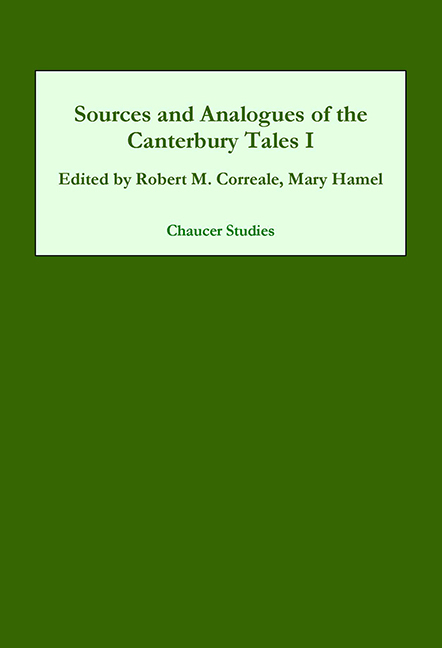Book contents
- Frontmatter
- Contents
- preface
- Acknowledgements
- The Frame
- The Reeve's Tale
- The Cook's Tale
- The Friar's Tale
- The Clerk's Tale
- The Squire's Tale
- The Franklin's Tale
- The Pardoner's Prologue and Tale
- The Tale of Melibee
- The Monk's Tale
- The Nun's Priest's Tale
- The Second Nun's Prologue and Tale
- The Parson's Tale
- Contributors and editors
- General Index
- Index of Manuscripts
The Second Nun's Prologue and Tale
Published online by Cambridge University Press: 25 October 2017
- Frontmatter
- Contents
- preface
- Acknowledgements
- The Frame
- The Reeve's Tale
- The Cook's Tale
- The Friar's Tale
- The Clerk's Tale
- The Squire's Tale
- The Franklin's Tale
- The Pardoner's Prologue and Tale
- The Tale of Melibee
- The Monk's Tale
- The Nun's Priest's Tale
- The Second Nun's Prologue and Tale
- The Parson's Tale
- Contributors and editors
- General Index
- Index of Manuscripts
Summary
With regard to the sources of the Prologue, the basic research was all done before 1920. Most obvious and first to be recognized was the indebtedness of the “Invocacio ad Mariam,” or at least three stanzas of it (lines 36–56), to the prayer to the Virgin spoken by St. Bernard in Dante's Paradiso, canto XXXIII. In 1891 Ferdinand Holthausen identified the Marian antiphon “Salve Regina” as the main source behind the next stanza and a half (lines 57–66, and perhaps 68). In 1911 Carleton Brown filled in most of the remaining gaps when he reviewed the evidence for the Prologue's direct dependence on these and several other possible sources. Brown admitted two additional texts to the list of actual sources, pointing out the clear echoes from the opening of Fortunatus’ hymn “Quem Terra” in Chaucer's lines 43–7 and the somewhat more tenuous parallels between Chaucer's lines 68–70 and a passage in Paradiso XXXII. Brown plausibly contended, however, that some images and phrases in the “Invocacio” were simply drawn from the common currency of medieval hymns to the Virgin, and he also concluded that Chaucer was drawing on a long tradition, rather than imitating any particular source, when he opened the Prologue with a discussion of idleness.
In 1915 Frederick Tupper provided a useful addendum to Brown's article when he pointed out that Chaucer could have found both the “Salve Regina” and the “Quem Terra” in the Hours (or Little Office) of the Virgin Mary, a liturgical office that was made widely accessible to members of the laity through its inclusion both in Latin Books of Hours and in the Middle English Prymer or Lay Folks’ Prayer Book. Two years later John Livingston Lowes proposed several additional sources for the Prologue, most notably a passage in praise of the Virgin in Alan de Lille's Anticlaudianus, which contains parallels to several of Chaucer's small additions to Dante in lines 37–8, 42, and 56, and a passage in Macrobius's commentary on the Somnium Scipionis which contains parallels to Chaucer's language in lines 71–4 about the plight of the human soul as imprisoned, troubled by the contagion of the body, and weighted down by earthly lusts.
- Type
- Chapter
- Information
- Sources and Analogues of the Canterbury Tales: vol. I , pp. 491 - 528Publisher: Boydell & BrewerPrint publication year: 2002



